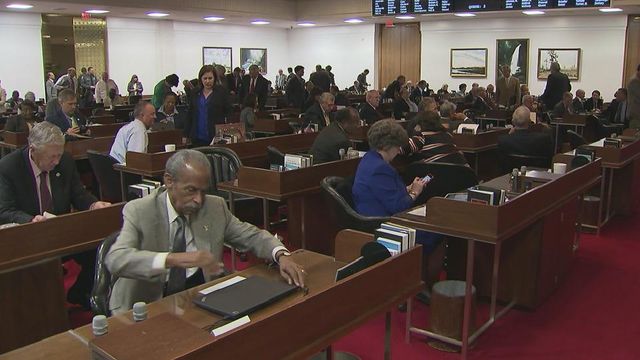$2B bond package passes first House vote
Late Monday night, the N.C. House gave tentative approval to the $2 B bond package House and Senate leaders agreed on last week. But some critics argued it's too much debt.
Posted — UpdatedAbout half of the package would go to finance new buildings and renovations at universities across the University of North Carolina system. The rest would go to community colleges, state parks and water and sewer infrastructure.
Rep. Dean Arp. R-Union, glowingly described the bond package as "writing a new story for North Carolina, a new vision of leadership and responsibility."
"Do you think it’ll cost less to build in the future?" Arp asked. "Do you think interest rates will be lower in the future than they are right now?"
Rep. Mark Brody, R-Union, said lawmakers shouldn't be borrowing so much money after blasting former Democratic leaders for running up the state's debt.
"We decided we’re not going to borrow, and we didn’t," Brody said. "Now, we’re going to go back up again, but it’s OK because we’re Republicans and we can do this."
Brody argued that the UNC system isn't operating at capacity now and so doesn't need to add capacity.
"We really don’t need to spend this money," he argued.
Rep. Michael Speciale, R-Craven, said he would have supported the bond package if some of the funding was going to roads, "but it's not."
"It's just Christmas for the UNC system and the community colleges, who are going to be getting money for buildings they don't need, a lot of which they didn't ask for," Speciale said "It's ridiculous. They can't fill the seats that they have now."
House Minority Leader Larry Hall joined in the criticism from a different angle.
"There's no question that we need to have these improvements in our state," Hall, D-Durham, said. "[But] why are we borrowing what we're borrowing at the same time that we're giving away revenue based on our tax policy?"
Arp countered that the state is rapidly paying down its existing debt and can easily afford the additional borrowing.
"I don't know of one business that does not use money as a tool and capitalize on future costs today if we can prove that this is cheaper," he said.
"I think it's a conservative, smart, business-like way to run the state," agreed Rep. Bill Brawley, R-Mecklenburg. "We're investing in the future."
The referendum would be on the ballot in the March 2016 primary election.
The measure passed its initial vote 86-23 and is scheduled for a final vote Tuesday. The Senate approved the plan last week.
Related Topics
• Credits
Copyright 2024 by Capitol Broadcasting Company. All rights reserved. This material may not be published, broadcast, rewritten or redistributed.






